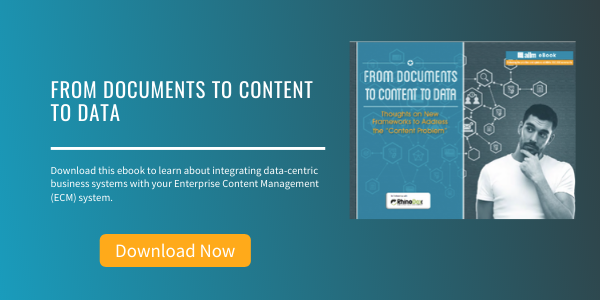
8 Things Vendors Need To Know About Selling Document Management to Small Businesses
-
Not all SMBs are the same.
I work for an insurance company with about 30 people, but we are more like an insurance company than we are like most 30-person organizations. We have Accounting, Underwriting, Claims, Loss Control, IT -- all the things you would expect to find in an insurance company. The nature of our business simply allows us to function with a small staff.
On the other hand, we are not enough like an insurance company to find value in the marketing materials you give to large insurance companies. If you want to market to us, you’re just going to have to get to know us. In many cases, given the amount of effort you (vendors) have to make for the limited amount of sales we can provide, it seems like you aren’t really interested. Or, you are only interested when the economy is bad – I’m hearing from a lot of interested vendors today.
-
There is opportunity here for you.
Just because we only have 30 inboxes doesn’t mean we don’t want or need email archiving. Just because we don’t measure our storage needs in Terabytes or Petabytes doesn’t mean we don’t perform daily backups. We have security programs in place. We perform daily backups, we store tapes off-site, and we back up critical files via the Internet. Oh, one other thing; just because we only bought 20 copies of your product doesn’t mean we don’t expect support after the sale.
-
Some SMBs have IT departments.
We may be a small staff, but we’re not stupid. We have experience, training and we generally understand the technology we are using. We invest both time and money into technology that adds value to our organization. We often purchase products but prefer to handle installation and configuration ourselves. Several ECM vendors have recently been taking the approach of telling us we made bad decisions when we bought their competitor’s product. As I recently explained to one vendor, we downloaded trial versions of both, evaluated them against our needs, and selected the other product. Your product came up short; don’t insult me.
-
Some of our expertise is not in-house.
Since we are small, we focus on the things that are truly important to our company’s goals. We rely on consultants and service providers for other tasks. If you want to work with us, you have to be willing to work with them.
-
We have budgets.
Just because we’re small doesn’t mean we work out of a common checkbook, and as long as there’s a positive balance, I can buy your product. We prepare budgets. We manage our operations with our budget in mind, and we report against our budgets. If I’m looking for a product like yours, it’s because I have already made the case to invest in the technology you provide. If I’m attracted to your product but didn’t already make the case to purchase it, I probably have to wait until the next budget is prepared.
-
Your product and your licensing have to scale.
Let me give you some real-life examples of licensing that doesn’t work. Per seat licensing that is sold in blocks of 100 seats. Per server licensing that includes our test server. Per email address licensing that includes SharePoint document libraries that are email enabled.
I had a vendor at AIIM Expo 2009 collect a few statistics about our operation and give me a 6-figure quote for a document production system. I explained that, in a good year, we would produce less than 10,000 documents with that system, but he stuck to the “in the end, it will pay for itself” line – No Sale!
I’ve also had vendors tell me that their product “has to run on its own server.” For 30 people? For 10,000 transactions a year? On the other hand, I’ve had vendors listen to me and effectively say, “we can work with you.” They have modified pricing or agreed to changes in platform specifications, and we are now their customers.
-
Technically adept small customers are good customers.
We are loyal to the vendors who take the time to understand us and who are willing to work with us. I have salespeople who tell me I’m not their biggest customer, but they appreciate the fact that, within their line of business, we give them all our business. Some of their large customers shop their business out with every quote, we price-check occasionally, but if you treat us fairly and provide value, we give you what business we have. By the way, we have been doing business with all our major vendors and resellers for over ten years!
-
Communication lines are short, and memories are long.
I’ve had more than my share of the hard sell vendors try to go around me to my boss. Trust me; I can walk to his office before you can dial our main number a second time. Try the “I’ve been talking to people in your accounts payable department,” and your product is DOA. And I will remember your company name, and so will the single person who handles our accounts payable.
About Dan Antion
Dan Antion is the former Chairman of the AIIM Board of Directors. He has spent almost 40 years developing information management systems, in a wide variety of industries. For the past 30 years, he has been Vice President, Information Services for American Nuclear Insurers, where he is responsible for data, content, and systems development across a broad range of platforms. His opinions do not represent American Nuclear Insurers, AIIM or the AIIM Board of Directors.



